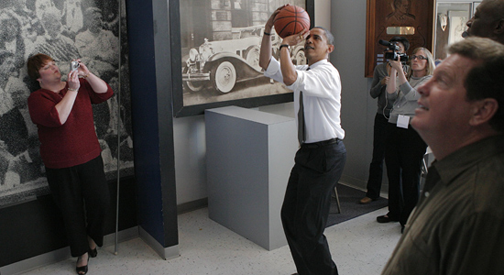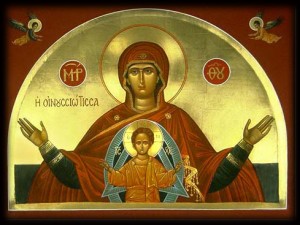 Tomorrow marks Barack Obama’s inauguration as U.S. President. No one can deny the historic nature of the event, and Obama’s undeniable personal charisma. Let’s face it, the man is Mad Men cool.
Tomorrow marks Barack Obama’s inauguration as U.S. President. No one can deny the historic nature of the event, and Obama’s undeniable personal charisma. Let’s face it, the man is Mad Men cool.
I’d enjoy hanging out with the guy – his two favorite sports are basketball and golf, same as mine. But it’s more than a tad ironic that he shoots lefty, because Obama fouls out when it comes to his views on morality.
No one has adressed the problem better than Mark Brumley, president of Ignatius Press, over at the Ignatius blog:
My Augustinian side is not so pronounced as to deny the possibility and indeed the reality of social progress. It is social progress that a nation such as ours, which once constitutionally allowed some people to buy and sell other people, no longer does. It is progress that half the population, which could not vote a hundred years ago, possesses suffrage today. However, my progressivism is not so naïve as to pretend that the diabolical is not at work within history. Two steps forward and one step back. Or is it one step forward and two steps back? In any event, we have gone from constitutional protection of people buying and selling people, and half the population being disenfranchised, to people legally killing their unborn babies in the name of freedom and equality of gender. And on a day when a symbol of triumph over the evil of slavery and racism is celebrated with the anticipation of the first black American, on the following day, to take the highest elected office in the land, the American victory is tainted by the man’s commitment to upholding the legal right of mothers, in the name of freedom and equality, to destroy the next generation. As a lover of my country, I cannot but rejoice and take pride in the fact that Barrack Obama represents the triumph of our nation and our political process over the grave evils of slavery and racism. That is not to be gainsaid. And as a lover of my country, I cannot at the same time but weep and hang my head in shame that more unborn children will die during a single year of Mr. Obama’s term in office, with his support and his invocation of the rhetoric of rights to sanction the evil, than deaths on both sides during the entire Civil War. Those who say there is no devil at work in history are only slightly less foolish than those who say there is no God.


 Just a couple of nights ago, I returned home from teaching the Bible Study class at St Justin Martyr, and, exhausted, flopped down to watch the end of the national championship game for U.S. college football. The University of Florida Gators, led by quarterback Tim Tebow, last year’s Heisman winner, defeated the University of Oklahoma Sooners.
Just a couple of nights ago, I returned home from teaching the Bible Study class at St Justin Martyr, and, exhausted, flopped down to watch the end of the national championship game for U.S. college football. The University of Florida Gators, led by quarterback Tim Tebow, last year’s Heisman winner, defeated the University of Oklahoma Sooners.  During these final days of the Christmas season, and particularly today, when so many throughout the world are celebrating the Epiphany, I thought I’d share with you this video clip. It’s a window into the devotion of Saint Josemaria Escriva, founder of Opus Dei, to the Infant Jesus. From the Opus Dei website, www.opusdei.ca:
During these final days of the Christmas season, and particularly today, when so many throughout the world are celebrating the Epiphany, I thought I’d share with you this video clip. It’s a window into the devotion of Saint Josemaria Escriva, founder of Opus Dei, to the Infant Jesus. From the Opus Dei website, www.opusdei.ca:  Today is not only New Year’s Day, but also the feast of Mary, Mother of God. It’s one of only two Holy Days of Obligation for Canadian Catholics other than Sundays (the other being Christmas).
Today is not only New Year’s Day, but also the feast of Mary, Mother of God. It’s one of only two Holy Days of Obligation for Canadian Catholics other than Sundays (the other being Christmas).